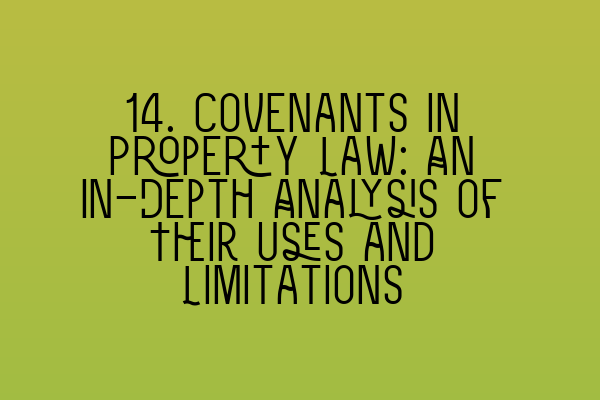14. Covenants in Property Law: An In-Depth Analysis of Their Uses and Limitations
Welcome to another informative blog post from SQE Property Law & Land Law. In today’s discussion, we will delve into the intricate world of covenants in property law. Covenants are crucial legal tools that can have a significant impact on property ownership and usage. Understanding their uses and limitations is essential for anyone involved in property transactions or disputes.
What are Covenants?
Before we dive deep into the analysis, let’s start with a basic definition. In property law, covenants are legal agreements or promises made between parties regarding the use, maintenance, or restrictions of a property. These agreements are often included in deeds and contracts and can be binding on future owners or occupiers of the property. Covenants serve to protect the rights and interests of both parties involved in a property transaction.
Types of Covenants
There are various types of covenants that can be encountered in property law. It’s important to understand these distinctions to navigate the complexities of property transactions effectively. Here are some of the most common types of covenants:
- Positive Covenants: Positive covenants require a party to do something specific, such as maintaining a property’s landscaping or paying regular maintenance fees. These covenants impose affirmative obligations on the party involved.
- Negative Covenants: Negative covenants, on the other hand, restrict a party from doing something specific. These restrictions can include limitations on building height, noise levels, or commercial activities on a property.
- Restrictive Covenants: Restrictive covenants are designed to maintain specific standards or preserve the character of a property or neighborhood. For example, a restrictive covenant may limit the use of a property to residential purposes only.
- Enforceability of Covenants: It’s crucial to determine whether a covenant is enforceable before relying on its terms. Some covenants may be deemed unenforceable due to changes in legislation or other mitigating factors. Conversely, some covenants may be enforceable in perpetuity, binding future owners of a property.
Use and Limitations of Covenants
Covenants serve several important purposes in property law. They can help maintain property values, preserve the character of a neighborhood, and protect the interests of property owners. Here are some specific uses of covenants:
- Protecting the rights of homeowners: Covenants can ensure that homeowners are not subjected to nuisances or undesirable activities from neighboring properties.
- Preserving property values: Restrictive covenants can maintain property values by preventing undesirable developments or uses.
- Controlling land usage: Covenants can be used to regulate how land is used, ensuring compliance with zoning regulations or other restrictions.
- Creating obligations between parties: Covenants can create legal obligations between parties involved in a property transaction, ensuring that both parties fulfill their agreed-upon responsibilities.
While covenants offer numerous benefits, they also have limitations that should be considered. Some limitations of covenants include:
- Enforceability: As mentioned earlier, not all covenants are enforceable. Changes in legislation or other circumstances can render a covenant unenforceable or irrelevant.
- Expiration: Covenants may have an expiration date, limiting their enforceability over time. It’s crucial to review the duration of a covenant and its implications before relying on it.
- Changes in circumstances: Circumstances can change over time, making certain covenants impractical or obsolete. Adapting to changing circumstances may require an amendment or modification to existing covenants.
- Conflicting covenants: In some cases, different covenants may conflict with each other, creating confusion and potential legal disputes. Understanding the hierarchy and priorities of multiple covenants is essential.
Seeking Legal Advice
Given the complexities and potential implications of covenants in property law, it’s advisable to consult a qualified solicitor for any property-related transactions or disputes. At SQE Property Law & Land Law, we have a team of experienced solicitors who specialize in property law and can provide expert advice tailored to your specific situation.
If you are preparing for the SQE 1 or SQE 2 exams, we also offer comprehensive preparation courses to help you succeed. Check out our SQE 1 Practice Exam Questions and SQE 1 Practice Mocks FLK1 FLK2 to enhance your study materials. If you want to stay updated with the SRA SQE Exam Dates, our SRA SQE Exam Dates page is a valuable resource.
Conclusion
Covenants play a vital role in property law by establishing obligations and restrictions on property owners and occupiers. Understanding the different types of covenants, their uses, and limitations is essential for property professionals and individuals involved in property transactions. If you need expert advice or assistance in navigating the complexities of covenants, don’t hesitate to contact SQE Property Law & Land Law. Our team of solicitors is ready to help you.
